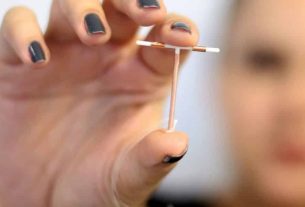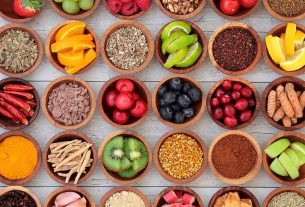Food before, during and after training to gain muscle mass and lose weight must be low in fat, moderate in carbohydrates and rich in protein, and must be included in a balanced and healthy diet to replenish all the energy throughout the day and stimulate muscle hypertrophy.
Furthermore, depending on the objective and type of training, different strategies can be used, being possible to fast before training, prolong food consumption or add supplements that help with muscle growth and physical performance.
Therefore, it is recommended that your diet be guided by a sports nutritionist who can provide more specific guidance on what foods should be eaten before and after training and in what quantities.

The recommended diet before and after training to lose weight and increase muscle mass is:
1. Before training
In general, before training, foods rich in carbohydrates and proteins should be consumed 2 to 3 hours before practicing physical activity, so the body has enough time to digest the food. Another alternative is between 60 and 30 minutes before training, consume some lighter food, rich in carbohydrates, such as fruit, yogurt with a spoonful of oats, a cereal bar or natural juice, for example.
However, to reduce body weight more efficiently, the amounts of carbohydrates consumed before training must be moderated very well, in order to generate a faster decrease in body fat, therefore, it is recommended to consume a protein-rich meal.
Pre-workout food options: omelette with cheese and a slice of wholemeal bread, low-fat yogurt with nuts and raspberries, avocado smoothie with milk and a teaspoon of oats, 1 slice of wholemeal bread with tuna and tomato or scrambled egg with vegetables and a slice of bread integral, for example. These foods should be consumed 2 to 3 hours before training. Check out some other pre-workout snack options.
Is it good to exercise on an empty stomach?
There is currently sufficient evidence that, in a controlled manner and under optimal conditions, exercising on an empty stomach can stimulate weight loss and optimize training performance, as it activates fat oxidation and increases training activity. However, fasting before exercise is only indicated when the exercise to be practiced is of low to moderate intensity and lasts a maximum of 1 hour. It is not recommended to fast for high-intensity training, functional or strength exercises to increase muscle mass.
Furthermore, it is important to highlight that exercising on an empty stomach, especially in people without a training rhythm, increases the chances of hypoglycemia, which is when blood sugar drops too low, causing symptoms of heart palpitations, paleness and a feeling of fainting. Therefore, it is not recommended to train fasting, which can reduce performance during training and reduce muscle mass, which is not good even for those who want to lose weight. See more about fasting physical activity.
2. During training
During training, you should drink water, coconut water or isotonic drinks, depending on the intensity and type of training. Liquids containing mineral salts help control the body’s chemical reactions during exercise and keep the body hydrated.
Although hydration is important in all types of training, it is even more important when training lasts more than 1 hour or when carried out in a high temperature or dry climate.
3. After training
Nutrition after training may be different depending on the objective, which may be to lose weight or increase muscle mass:
Food to lose weight
Eating after training is important to prevent loss of muscle mass and promote muscle recovery. When the main objective is weight loss, it is not necessary to immediately replace carbohydrates and proteins, and it is recommended that the person wait a while to eat, as this allows fat to oxidize, which helps to lose weight.
The most important thing is the body’s recovery through adequate hydration and intake of mineral salts that were lost through sweat. Therefore, it is important to replace it with isotonic drinks that do not contain a lot of sugar, coconut water, natural juices or milk, for example.
However, if you have a strong appetite and desire to eat, after an hour of training, you can eat foods rich in protein, controlling your calorie intake so that your training is effective.
Post-workout food options to lose weight: skimmed milk with cocoa and unsweetened + yogurt with fruit + spinach omelet with fruit or nuts.
Food to increase muscle mass
When the main objective is to gain muscle mass, to recover the muscle and stimulate hypertrophy, it is recommended that post-workout be done no more than 45 minutes after training, and should be rich in proteins and carbohydrates, in addition to adequate hydration. .
Post-workout food options for hypertrophy: skimmed milk with unsweetened cocoa and granola, yogurt with fruit and oats, omelet with cheese and wholemeal bread. However, if it is close to lunch time, you should have lunch, including whole grains, vegetables and low-fat proteins such as chicken, fish, eggs or tofu.
Furthermore, there are dietary supplements that can be recommended by a nutritionist to promote muscle mass gain and improve physical performance, such as whey protein and creatine, for example, which should be used in accordance with nutritional guidance and can be included both pre- and post-workout. See how to take creatine.
Check out the following video for a vitamin option to take after training that helps you gain muscle mass:

Sign up for our newsletter and stay up to date with exclusive news
that can transform your routine!
Warning: Undefined array key "title" in /home/storelat/public_html/wp-content/plugins/link-whisper-premium/templates/frontend/related-posts.php on line 12
Warning: Undefined array key "title_tag" in /home/storelat/public_html/wp-content/plugins/link-whisper-premium/templates/frontend/related-posts.php on line 13




